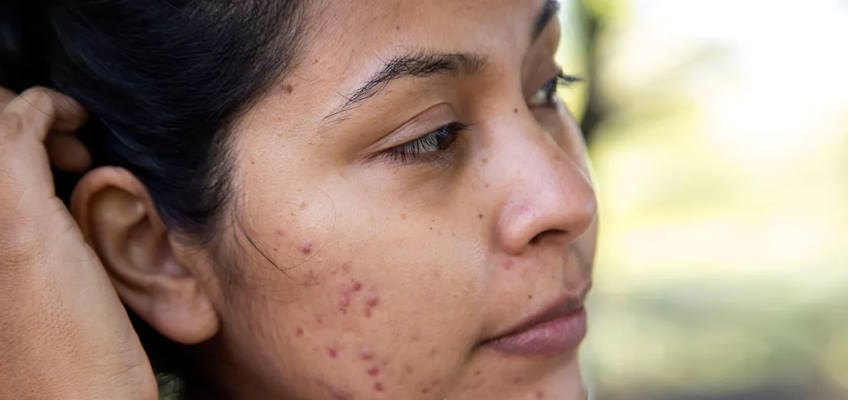Don’t be Scarred: 5 Practical Ways to Minimize an Acne Scar
Table of Contents
Most people consider acne to be a teenage problem, as a result of hormonal changes. However, people of all ages can actually be afflicted by acne well after their teenage years.
And even if the acne breakouts have passed, there’s the burden of acne scars. In fact, even with mild acne, the scarring can last for months. In the more serious cases, it can last for years. Some can even be permanent.
Luckily, using the right skin care regimen can fade them as much as possible and regain or establish your confidence. In this guide, we discuss five ways you can reduce acne scars and restore smooth, healthy skin.
Develop a Morning Skincare Routine

At night, you may sweat. That sweat is known to cause acne because it clogs your pores.
It doesn’t help that your pillowcase, especially if you’re not washing it regularly, can harbor dirt and oil, which can contribute to acne if you’re prone to it.
Therefore, when you wake up in the morning, you should cleanse your face. Not only does the cleanser remove oil, debris, and bacteria to help with acne, but it cleans your face so any treatments you’re using for the scarring will reach your skin more effectively.
You can find ones with benzoyl peroxide for acne over the counter to help target current outbreaks or prevent future ones.
The next step is to use an exfoliant to remove any dead skin cells. When you exfoliate, you also break up pigmented cells and clean any remaining dirt on your face. Overall, this gives your skin a better appearance and helps fight against acne.
You may want to opt for one with a toner to further enhance its benefits. The toner helps to maintain your skin’s pH balance. Toner can help to prevent acne scarring as well.
As it improves the appearance of your skin, it may reduce the appearance of any blemishes.
You could use a brightening serum, which will enhance the glow of your skin and possibly make the scarring look less noticeable.
Finish your morning routine with a moisturizer. Not only will this keep your skin looking healthy, but certain ingredients in moisturizers help with acne scarring, such as vitamin C or retinol (a form of vitamin A). Plus, the retinol acts as an anti-aging serum, which is a win-win for your face.
Develop a Nighttime Skincare Routine
Use your cleanser and moisturizer as you did in the morning to keep your skin soft and supple. Keep in mind that dry skin can slow the healing process, so moisturizing twice daily can ensure you heal as you should.
Other possible treatments you may want to include in your PM routine include the following:
- Micellar water – removes dirt and oil naturally to prevent future breakouts
- Acid toner – removes dead skin cells, cleanses pores, encourages collagen production, treats acne, exfoliates skin
- Pigmentation serum – evens skin tone, reduces hyperpigmentation, and possibly may diminish acne scarring (some)
Eat Nutrient-Rich Foods

You can change your diet or at least add certain foods to it to assist with acne scar healing.
For instance, vitamin C plays a role in wound healing since it encourages collagen growth — a protein essential in the healing process.
This antioxidant can reduce the appearance of scars by helping it look more like the original and restoring strength to the skin.
Some foods that contain this nutrient include:
- Oranges
- Grapefruit
- Bell peppers, particularly red ones
- Tomatoes
- Potatoes
Vitamin K may also help with the appearance of scars, reduce scar tissue, and affect tissue healing.
You can obtain this nutrient by eating:
- Spinach
- Kale
- Broccoli
- Brussels sprouts
The mineral zinc impacts wound healing. It’s also known to generate cell growth and lower inflammation. Both can help scars heal as much as possible. You can find zinc in meat, shellfish, eggs, and nuts.
Iron, another mineral, supports collagen formation, ultimately helping with the healing process. Obtain iron through organ meats, dark chocolate, fortified breakfast cereals, and soybeans.
Know Which Foods to Avoid
Some foods may contribute to more acne breakouts, which leads to scarring. It’s a vicious cycle.
By avoiding certain foods, you can reduce the severity and prevalence of these flares. Some of the more common ones are as follows:
- Any processed carbohydrates
- Sugary foods and beverages
- Fast food
- Soy products
Besides taking caution to prevent acne, certain foods can negatively influence healing, which could affect you if you experience future breakouts.
A prime example is sugar. If you’re eating a diet high in simple sugars, you could degrade elastin and collagen levels, both of which are necessary for wound healing.
Consider Lifestyle Changes
Though many swear it contributes marijuana to acne, research doesn’t indicate it has a direct connection with this skin condition. However, if you have the “munchies” and eat sugary foods, you could worsen your acne.
Smoking marijuana may cause inflammation, while cannabis in general can raise hormone levels and increase anxiety, all of which have the potential to affect acne. If you’re not noticing any effects, you can continue to use it.
Think about watching your alcohol intake. For one, alcohol can cause a rise in estrogen in both men and women. This hormone is notorious for causing acne outbreaks. Not to mention, these hormonal spikes can worsen an existing case.
Binge drinking and excessive alcohol use can weaken your immune system. As a result, your wounds may not heal as they should.
Other possible concerns from alcohol that can affect acne scarring and your skin include impaired liver function, dehydration, and an elevation in inflammation.
Another substance to watch out for is caffeine. While it’s fine in moderation, it can contribute to acne or trigger the onset of an outbreak by increasing cortisol levels in the body.
This hormone can help you with stress levels, but an increased amount can impact how much oil and sebum are in the skin.
Overall, keeping your skin hydrated and clean can assist in future breakouts, but what you eat and your lifestyle habits can play roles as well as affect your scar healing.
Post by:
Marcella Jiovanni
Skin Care Professional
“Marcella Jiovanni actively promotes the importance of maintaining healthy skin, she envisions the future of dermatology as moving away from pure medical, pharmacological dermatology and flowing more toward a holistic approach to wellness and skincare.”

















